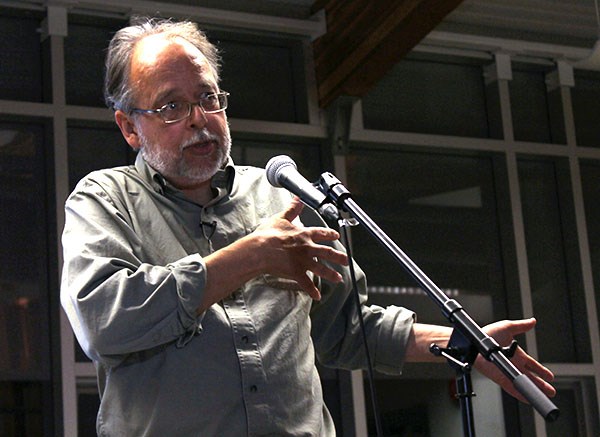There is no question of which side of the LNG discussion Andrew Nikiforuk stands. On Thursday, Sept. 25 he spoke for an hour and a half in the Quest University library about hydraulic fracturing — a process called fracking — and liquid natural gas (LNG) in Western Canada. He let it be known he’s clearly displeased with the way things are proceeding in this industry.
In front of a crowd of more than 150 people, Nikiforuk explained the history of fracking, current industry techniques, uncertainties of the practice, costs, foreign ownership, profitability, and how the provincial government is approaching LNG.
“The LNG strategy is all about extending the life of fossil fuels in a highly complex, highly capital and energy intensive way when all the scientific evidence is suggesting we need to go in a different direction,” he said.
Nikiforuk’s main arguments against fracking and exporting LNG from Western Canada are methane leakage; damaging ground water; the amount of energy required to extract, collect, process and transport natural gas; the pitfalls of foreign ownership with limited government taxation and oversight; the increasing costs of producing natural gas and as a result the limited profitability of this endeavour. Though his talk mostly addressed issues at a provincial level, Nikiforuk stated that a Woodfibre LNG plant in Squamish would likely create fewer than 100 jobs.
“You don't need a lot of people to run a capital intensive, highly complex LNG facility,” he said. “Chances are half the people working there are from Royal Golden Eagle, [a conglomerate of resource development companies with an interest in Canada's LNG]. They'll be from Singapore or Malaysia – people with experience running LNG terminals.”
There could be all kinds of impacts, Nikiforuk said.
“You can't have something this big run by foreign multi-nationals that doesn't dislocate other economies in town,” he said. “It will have an impact on tourism, the oceanfront and a lot of unexpected and unanticipated impacts both politically and economically, as well as environmentally.”
Nikiforuk has been writing about energy for the past 20 years – including seven books on the topic – the latest of which is titled, The Energy of Slaves.
His talk last week was hosted by My Sea to Sky, an anti-LNG group created last March by Squamish citizens opposing the Woodfibre LNG project.
Video Produced by: Les McDonald - Tracker Productions




